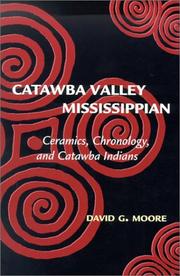| Listing 1 - 2 of 2 |
Sort by
|

ISBN: 0817382097 9780817382094 0817312560 9780817312565 0817311637 9780817311636 0817312560 9780817312565 Year: 2002 Publisher: Tuscaloosa : University of Alabama Press,
Abstract | Keywords | Export | Availability | Bookmark
 Loading...
Loading...Choose an application
- Reference Manager
- EndNote
- RefWorks (Direct export to RefWorks)
An excellent example of ethnohistory and archaeology working together, this model study reveals the origins of the Catawba Indians of North Carolina. By the 18th century, the modern Catawba Indians were living along the river and throughout the valley that bears their name near the present North Carolina-South Carolina border, but little was known of their history and origins. With this elegant study, David Moore proposes a model that bridges the archaeological record of the protohistoric Catawba Valley with written accounts of the Catawba Indians from the 17th, 18th, and 19th centuries, thus
Mississippian culture. --- Catawba Indians --- Temple Mound culture --- Indians of North America --- Mound-builders --- Kataba Indians --- Siouan Indians --- History. --- Antiquities. --- Antiquities --- Yadkin River Valley (N.C.) --- Catawba River Valley (N.C. and S.C.) --- Yadkin Valley (N.C.) --- Catawba Valley (N.C. and S.C.)
Book
ISBN: 0813051231 0813055679 9780813055671 9780813051239 9780813061597 0813061598 Year: 2016 Publisher: Gainesville, Florida : University Press of Florida,
Abstract | Keywords | Export | Availability | Bookmark
 Loading...
Loading...Choose an application
- Reference Manager
- EndNote
- RefWorks (Direct export to RefWorks)
Established in 1566 by Spanish conquistador Juan Pardo, Fort San Juan is the earliest known European settlement in the interior United States. Located at the Berry site in western North Carolina, the fort and its associated domestic compound stood near the Native American town of Joara, whose residents sacked the fort and burned the compound after only eighteen months. Drawing on archaeological evidence of architecture, food, and material culture, as well as newly discovered accounts of Pardo's expeditions, the contributors to this volume explore this borderland location at the northern frontier of Spain's long reach. They piece together the fragments of the colonial encounter between Pardo's thirty soldiers and the people of Joara to chronicle the deterioration in Native American-Spanish relations that sparked Joara's revolt. Fort San Juan and the Limits of Empire offers critical insight into the nature of early colonial interactions.
Excavations (Archaeology) --- Fortification --- Indians of North America --- Spaniards --- Spanish people --- Ethnology --- Archaeological digs --- Archaeological excavations --- Digs (Archaeology) --- Excavation sites (Archaeology) --- Ruins --- Sites, Excavation (Archaeology) --- Archaeology --- American aborigines --- American Indians --- First Nations (North America) --- Indians of the United States --- Indigenous peoples --- Native Americans --- North American Indians --- Fortification, Primitive --- Forts --- Military engineering --- Siege warfare --- History --- Antiquities. --- Culture --- Pardo, Juan, --- Morganton Region (N.C.) --- North Carolina --- Burke County (N.C.) --- Burke Co., N.C. --- State of North Carolina --- Carolina del Norte --- NC --- N.C. (North Carolina) --- N. Car. --- Noord-Carolina --- Carolina d'o Norte --- Estato de Carolina d'o Norte --- Şimali Karolina --- Штат Паўночная Караліна --- Shtat Paŭnochnai︠a︡ Karalina --- Паўночная Караліна --- Paŭnochnai︠a︡ Karalina --- Not Carolina --- Sjeverna Carolina --- Carolina an Norzh --- Norzhkarolina --- Северна Каролина --- Severna Karolina --- Щат Северна Каролина --- Shtat Severna Karolina --- Carolina del Nord --- Çурçĕр Каролина --- Śurśĕr Karolina --- Severní Karolína --- Gogledd Carolina --- Náhookǫsjí Kééláanah Hahoodzo --- Põhja-Carolina --- Põhja-Carolina osariik --- Βόρεια Καρολίνα --- Voreia Karolina --- Πολιτεία της Βόρειας Καρολίνας --- Politeia tēs Voreias Karolinas --- Estado de Carolina del Norte --- Norda Karolino --- Ipar Carolina --- Caroline du Nord --- Noard Karolina --- Carolina Thuaidh --- Carolina Hwoaie --- Poyraz Karolina --- Carolina a Tuath --- Ар Карелайн --- Ar Karelaĭn --- Norda-Karolina --- Nort Kárólínạ --- Carolina Utara --- Negara Bagian Carolina Utara --- Kaaruuliinaa tunuviaq --- Nigiq Carolina --- Цæгат Каролинæ --- T︠S︡ægat Karolinæ --- Norður-Karólína --- קרוליינה הצפונית --- Ḳarolinah ha-Tsefonit --- Karolina Gledh --- Karolin dinò --- Karolînaya Bakur --- Йыдвел Каролина --- Ĭydvel Karolina --- Province of North Carolina --- Discovery and exploration --- Spanish.
| Listing 1 - 2 of 2 |
Sort by
|

 Search
Search Feedback
Feedback About UniCat
About UniCat  Help
Help News
News